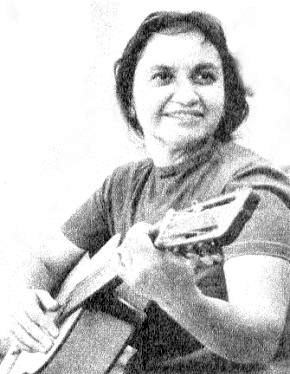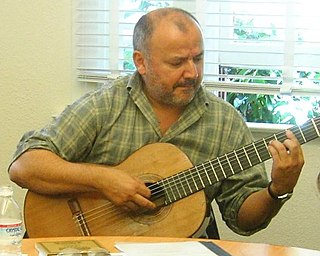
Violeta del Carmen Parra Sandoval was a Chilean composer, singer-songwriter, folklorist, ethnomusicologist and visual artist. She pioneered the Nueva Canción Chilena, a renewal and a reinvention of Chilean folk music that would extend its sphere of influence outside Chile.
Chilean music refers to all kinds of music developed in Chile, or by Chileans in other countries, from the arrival of the Spanish conquistadors to the modern day. It also includes the native pre-Columbian music from what is today Chilean territory.

Inti-Illimani are an instrumental and vocal Latin American folk music ensemble from Chile. The band was formed in 1967 by a group of university students and it acquired widespread popularity in Chile for their song Venceremos, which became the anthem of the Popular Unity government of Salvador Allende. When the 1973 Chilean coup d'état took place, they were on tour in Europe and were unable to return to their country where their music was proscribed by the ruling military junta of Augusto Pinochet. In Europe their music took on a multifarious character, incorporating elements of European baroque and other traditional music forms to their Latin American rhythms, creating a fusion of modern world music. Their name means 'Sun of the Golden Eagle' in Aymara.

Cueca is a family of musical styles and associated dances from Chile, Argentina, and Bolivia. In Chile, the cueca holds the status of national dance, where it was officially declared as such by the Pinochet dictatorship on September 18, 1979.

Horacio Salinas Álvarez is a Chilean guitarist and composer. He is cofounder and musical director of the Chilean group Inti-Illimani Histórico. He has a huge repertory of compositions that involves folk, Andean music, protest music, world music, contemporary classical music and many Latin American styles and fusions. In 1973, his group was touring in Europe when Augusto Pinochet seized power in Chile, after which they had to stay in exile for years. He has played with many international musicians notably the Australian classical guitarist John Williams.
Luis Advis Vitaglich was a Chilean professor of philosophy, and a noted composer of traditional and New Chilean music. He was officially recognized as a fundamental figures of Chilean music in 2003.

Rodeo is a traditional equestrian sport in Chile, declared the national sport in 1962.

"Arriba en la Cordillera" is a song by the Chilean singer-songwriter Patricio Manns released as single in 1965 and included in the 1966 studio album Entre Mar y Cordillera. It reached #1 on the Chilean charts and was chosen as the most popular song at Huaso de Olmué Festival in 2009.

Silvia Ofelia Urbina Pinto was a Chilean singer, folklorist and teacher. Urbina had a vast trajectory in the investigation, research and dissemination of Chilean folk music. She was one of the founders of the Cuncumén folkloric group and later creator of the children's musical folkloric group, Cuncumenitos.

Los Huasos Quincheros are a popular Chilean folk musical group, first formed in 1937. It currently consists of the musicians Antonio Antoncich, Jose Vicente Leon and Rafael Prieto. The group was nominated for an International Music Prize in 1970.

Mireya Cecilia Ramona Pantoja Levi, better known simply as Cecilia or Cecilia la Incomparable, was a Chilean singer-songwriter, and a member of the nueva ola music movement.
Sonora Palacios is one of Chile's oldest tropical orchestras. Formed in the early 1960s, the group is one of the main exponents of Chilean cumbia and were pioneers of the style. They were the first Chilean band to record cumbia and are widely recognized for establishing the popularity of cumbia in Chile.

Raquel Barros Aldunate was a Chilean folklorist, noted for her studies and dissemination of Chilean folk music and dance.

Mexican music enjoys widespread popularity in some social and geographic sectors of Chile. In particular, Mexican music is especially popular among Chilean rural lower classes. Geographically, Mexican music is most popular in south-central Chile, but there are also significant audiences elsewhere, such as in the northern city of La Serena. Mexican corridos commonly perform in Chilean national day celebrations of Fiestas Patrias.

Chile, la alegría ya viene is a 1988 studio album released by the Alerce label in support of the "No" option campaign in the Chilean national plebiscite of that year. The song of the same name, which became the official jingle for the campaign.

Toda Violeta Parra: El folklore de Chile Vol. VIII is an album by Violeta Parra released on the Odeón label in late 1961. It was the fifth full-length album by Parra and part of Odeón's "El folclore de Chile" series to which Parra contributed five albums. The album contains 14 songs collecting Parra's work as a folk songwriter at different stages of her career. The album was Parra's first to explore issues of social justice and includes three tracks in which she set to music poems of Nicanor Parra and Pablo Neruda.

Huasita Regalona is a song written by Chilean songwriter Donato Román. It was first recorded by Chilean singer Ester Soré who also issued an album in 1959 under the same name. Another popular version of the song was recorded by Silvia Infantas.
Fundamental figure of Chilean music, or "Figura fundamental de la música chilena", is an award presented annually by the Sociedad Chilena de Autores e Intérpretes Musicales (SCD), recognizing Chilean artists who have had important influence and legacy in the country's musical history. The selection is made by the organization's board of directors.

Humberto Waldemar Asdrúbal Baeza Fernández, also known as Tito Fernández, El Temucano, was a Chilean singer-songwriter and folklorist. He recorded and released more than 40 albums from the 1970s to the present.

Dúo Rey-Silva was a Chilean musical duo consisting of Alberto Rey (1915-1991) and Sergio Silva (1917-2017). Both sang while Rey played the harp and Silva the guitar. They performed principally in the cueca and tonada traditions. They also performed in Chilean motion pictures from the 1940 to the 1960s. Rey was also known for his work as a soloist on the harp. In 1996, they were honored with the designation as fundamental figures of Chilean music.















